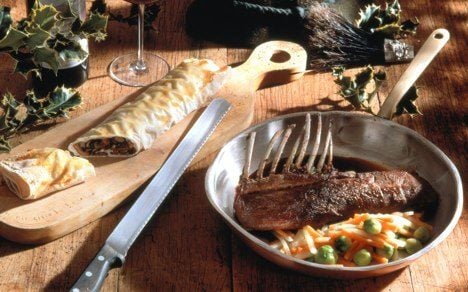A good roast needs a lot of time and love. To make the effort worthwhile, you need good meat – so you should be prepared to spend a bit of money.
Only 30 years ago, in many German homes meat was only served on Sunday. A Sunday roast was a feast for the eyes, the nose, and the palate, and it was a social event. When there was a roast, the whole family would gather round the table to savour it, to talk and laugh.
In 1980, the average German ate 30 kilos of meat and sausage every year. By 2009, it was 88 kilos. That figure has occasionally climbed even higher in the intervening years.
It took the BSE crisis in the late 1990s and various other meat scandals to derail the steady rise in German meat consumption. But even in the years directly after the mad cow disease scare, the average was around 80 kilos.
The mass consumption of meat, eggs and milk causes a multitude of environmental problems, as well as some ethical ones. And as the current dioxin feed scandal shows – once again – the cheap industrial production of farm animals also creates a host of health issues.
If the entire population of the world – soon to reach seven billion people – lived like Germany and other industrial nations, we’d need at least two planets to feed everyone. Around a third of the world’s greenhouse gas emissions comes from farming food.
The biggest threat for the climate, biodiversity and local water cycles is the transformation of jungles and marshes into farming land. This conversion is the largest single cause of climate change, estimated at between six and 17 percent. The actual agricultural production from this land accounts for another 15 to 16 percent.
Livestock play an important part in this, not only because cows, sheep and goats produce the dangerous greenhouse gas methane when they digest. But what is much worse for the climate is growing animal feed crops using chemical fertilizers, because artificial fertilizers produce nitrous oxide – also known as laughing gas – whose effect on the climate is even worse than methane.
Nitrous oxide is also released when marshes are drained, which is why transforming land for agricultural use plays such a big part in unbalancing our climate.
Keeping livestock is not only a climate problem. Huge quantities of water are needed to produce feed, and agricultural land is much worse at storing water than forests. And there are moral problems as well, because so many ways of raising farm animals amount to pure torture.
Pigs are kept in tiny boxes on their own until a bolt gun releases them from a wretched life. Chickens do have a little more space than they did in the old battery farms, but keeping smaller groups in cages hardly amounts to ensuring a good quality of life.
The pressure to produce feed as cheaply as possible is for many manufacturers little more than a welcome invitation to mix any old trash into the feeding troughs. It’s no coincidence that almost all the food scandals of the last 20 years had their origins in the animal feed.
But a good steak or a nice Sunday roast isn’t necessarily all bad. That is at least the opinion of Berlin veterinarian Anita Idel, one of the authors of the new global agriculture report.
Idel argues that cattle could even have a positive effect on the climate, if cows were allowed to be cows – that is, if cows, sheep and goats were fed only grass, for which they are optimally designed.
Around 40 percent of the world’s land surface is grassland. If it is not over-grazed, grassland can store substantial quantities of carbon dioxide. According to the pioneer of German climate research Hartmut Graßl, the world’s forests and grasslands can absorb between 2.5 and 2.8 gigatonnes of CO2 every year.
Alexander Popp, Hermann Lotze-Campen und Benjamin Bodirsky of the Potsdam-Institute for Climate Impact Research (PIK) argue that if we returned to the tradition of the Sunday roast – or any day of the week you might prefer – and consumed fewer dairy products, Germans could be healthier and do the atmosphere a service too.
But the scientists have calculated if people in the industrialize world do not alter their lifestyles, and if the developing nations catch up at the same breakneck pace they have done in the past 15 years, emissions of methane and nitrous oxide will have increased by 75 percent by 2050 compared to 1995.
Hartmut Graßl has been campaigning for the Sunday roast mainly because three important factors have already converged that “go beyond what the Earth can endure.” “The nitrogen cycle has gone out of control,” he says. The planet’s atmosphere is overloaded with greenhouse gases and the speed with which animal and plant species as well as whole ecosystems are disappearing is far outstripping the pace of evolution.
The Sunday roast is not the solution to all these problems, but a return to this stuffy ritual – which holds happy childhood memories for many people – could ease them a little. It’s a question of “setting a precedent,” says Popp. And not least it’s a question of health.
Eat less meat, and when you do buy the more expensive kind, farmed under animal-friendly conditions without poisonous feed. Go on, treat yourself and your family to something special.
This article was published with the kind permission of Berlin newspaper Der Tagesspiegel, where it originally appeared in German. Translation by The Local.



 Please whitelist us to continue reading.
Please whitelist us to continue reading.
Member comments